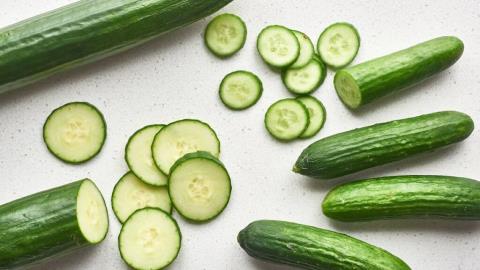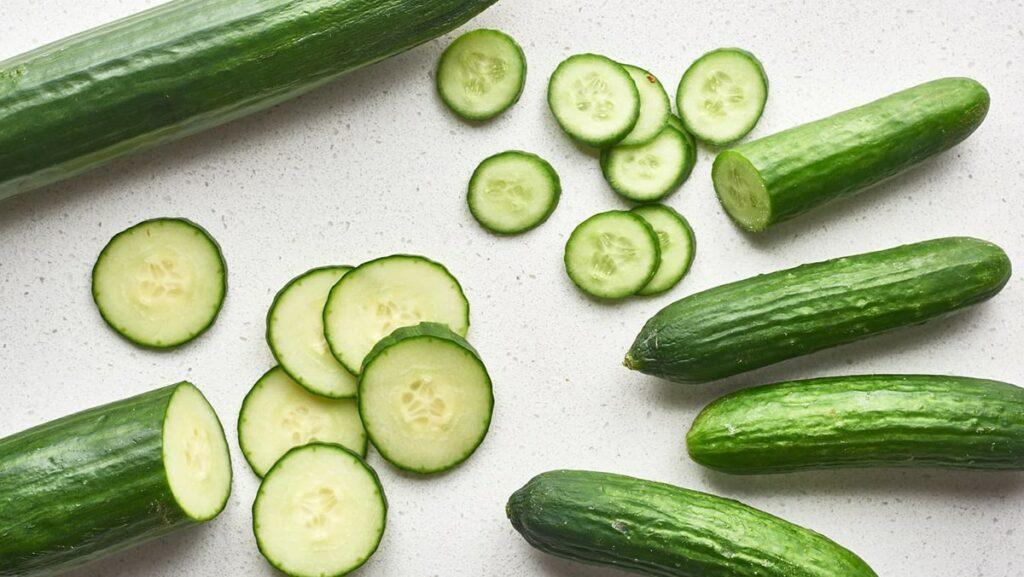How many calories are cucumbers and great health benefits

Cucumber is a mild, refreshing food that is easy to add to various dishes. Eating cucumbers as part of a balanced diet and healthy lifestyle can provide many great benefits to the body. Learn more about the uses of Cucumber with SignsSymptomsList!
content
- 1. What do you know about Cucumber?
- 2. Nutritional ingredients in Cucumber
- 3. What is the effect of cucumber?
- 4. Dishes made from Cucumber
- 5. Points to note when using Cucumber
1. What do you know about Cucumber?
Cucumber is also known as cucumber . They have a light, refreshing taste and a high water content. Cucumber helps reduce dehydration and provides a pleasant feeling when eaten in hot weather.
- Cucumber is used as a savory dish, but is actually a fruit. In addition, cucumber is also used in the field of beauty.
- For more information, cucumber is a member of the family Gourds. Other members of the family include squash and different types of melons, including bitter melon. Cucumbers provide many nutrients but are low in calories, fat, cholesterol and sodium.

Cucumber is also known as cucumber
2. Nutritional ingredients in Cucumber
How many calories does a cucumber contain?
Cucumbers are low in calories but packed with important vitamins and minerals.
One 11-ounce (300-gram) raw, unpeeled cucumber contains the following:
- Calories: 45.
- Total fat: 0 grams.
- Carbs: 11 grams.
- Protein: 2 grams.
- Fiber: 2 grams.
- Vitamin C: 14% of the RDI.
- Vitamin K: 62% of the RDI.
- Magnesium: 10% of the RDI.
- Potassium: 13% of the RDI.
- Manganese: 12% of the RDI.
A typical serving is only one-third the size of a cucumber. So eating a standard portion will provide about a third of the nutrients above.
Besides, cucumber has a high water content (about 96% water).
To maximize their nutrient content, cucumbers should be eaten with the skin on. Peeling them reduces the amount of fiber, as well as certain vitamins and minerals.
3. What is the effect of cucumber?
3.1. Hydration
- Cucumbers are mostly water and they also contain important electrolytes. They can help prevent dehydration in hot weather or after a workout.
- For those who don't like drinking water, adding cucumber and mint can make it more appealing.
- Drinking enough water is essential to maintain a healthy gut, prevent constipation, avoid kidney stones, etc.
3.2. Bone Health
- Vitamin K helps with blood clotting and it may support bone health.
- Cucumber also contains 19.9 mg of calcium. Adults need 1,000–1,200 mg of calcium per day, depending on gender and age.
- Vitamin K helps improve calcium absorption. Taken together, these nutrients can contribute to healthy bones.
3.3. Cancer
- As a member of the cucurbit family, cucumbers contain high levels of bitter nutrients called cucurbitacins.
- According to an article in the International Journal of Health Services , cucurbitacins may help prevent cancer by stopping cancer cells from reproducing.
- A 133-g serving of chopped cucumber with the peel also provides about 1g of fiber. Fiber may help protect against colorectal cancer
3.4. Heart health
- The American Heart Association (AHA) notes that fiber can help manage cholesterol and prevent related heart problems.
- One cup of unpeeled cucumbers weighing 142 g also provides 193 mg of potassium and 17 mg of magnesium. The dietary guidelines recommend adults consume 4,700 mg of potassium per day and 310-410 mg of magnesium, depending on gender and age.
- Reducing sodium and increasing potassium intake can help prevent high blood pressure
- The cucurbitacins in cucumbers can also help prevent atherosclerosis
3.5. Diabetes
Cucumber contains substances that can help lower blood sugar or prevent blood sugar from getting too high.
One theory is that the cucurbitacins in cucumbers help regulate insulin release and glycogen metabolism in the liver. This is an important hormone in blood sugar processing.
One study found that cucumber peel helped control symptoms of diabetes in rats. This may be due to the antioxidant content.
According to the AHA, fiber also helps prevent and control type 2 diabetes .
Cucumber scores low on the glycemic index (GI). This means they provide essential nutrients without the added carbohydrates that can spike blood glucose levels.
3.6. Inflammation
Cucumber may have anti-inflammatory benefits. Inflammation is a function of the immune system.
Experts believe that inflammation can help trigger the development of various health conditions.
- Heart-related diseaes.
- Diabetes.
- Autoimmune conditions.
- Sad state.
- Cancer.
7. Skin care
Several studies have suggested that the nutrients in cucumber may provide benefits for skin health.
What is the use of cucumber mask?
Cucumber sliced directly onto the skin can help cool and soothe the skin, reducing swelling and irritation. It can soothe sunburn. When applied to the eyes, they can help reduce puffiness in the morning.
4. Dishes made from Cucumber
Mild with a particularly crunchy and refreshing flavor, cucumbers are often enjoyed fresh or pickled in everything from salads to sandwiches.
Cucumbers are also often eaten raw as a low-calorie snack or can be combined with hummus, olive oil, salt or salad dressings for extra flavor.
With just a little creativity, cucumbers can be enjoyed in many different ways.
Here are some recipes to help incorporate cucumbers into the diet:
- Grilled cucumber fries.
- Pickled cucumbers.
- Slice cucumbers to make a delicious salad.
- Water soaked in strawberry, lemon, cucumber and mint .
- Grilled cucumber with cheese.
- Salted cucumber.
- Cucumber pork ear salad.
- Stir-fried squid with cucumber.
5. Points to note when using Cucumber
Cucumber is considered safe for most people. However, there are also some issues to keep in mind.
Digestive disorders including dyspepsia.
Blood clotting:
- Cucumbers are relatively high in vitamin K. Eating too much cucumber can affect a person's blood clotting.
- Subjects taking warfarin (Coumadin) or similar blood-thinning medications should not increase their intake of cucumbers suddenly or suddenly without consulting their doctor.
Allergy:
- Some people have reported allergic reactions to cucumbers. Anyone with a known allergy should avoid all contact with cucumbers.
- Symptoms of a reaction include: Skin rash, swelling, difficulty breathing.
If you have breathing problems, you need to go to the nearest hospital for timely emergency treatment. Anaphylaxis is a serious allergic reaction that can be life-threatening
Cucumber is a mild, refreshing food that is easy to add to various dishes. Like other fruits and vegetables, it is a good source of nutrients. Eating cucumbers as part of a balanced diet and healthy lifestyle can provide many great benefits for your health. body.